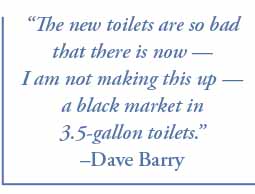

The BC Liberals want to legislate low-flow toilets. The NDP wants to ban run-of-river hydro.
So say media reports about the government’s Living Water Smart plan announced on June 3. Among other H20-saving measures, the province calls for mandatory low-emission toilets in all new homes built in British Columbia.
The opposition’s response — predictably — was to call for a ban on run of river.
And why not? The NDP has found it a terrific solution to other problems. Our climate is changing, our population is growing and we need more electricity. So what should we do? Ban run of river.
But effluent-effusion edicts have proven ineffectual in the U.S., where low-flow toilets have been mandatory for new homes since 1992. American social commentator Dave Barry analysed the problems with legislated latrines:
“They stink. Literally. You have to flush them two or three times to get the job done. It has become very embarrassing to be a guest at a party in a newer home because if you need to use the toilet, you then have to lurk in the bathroom for what seems (to you) like several presidential administrations, flushing, checking, waiting, flushing, checking, while the other guests are whispering: ‘What is (your name) DOING in there? The laundry?’”
Barry pointed out the low-flow flaw:
The mandatory 1.6-gallon toilets, he wrote, “are ‘saving’ water by requiring everybody to flush them enough times to drain Lake Erie on an hourly basis. The new toilets are so bad that there is now — I am not making this up — a black market in 3.5-gallon toilets. People are sneaking them into new homes, despite the fact that the Energy Policy and Conservation Act provides for — I am not making this up, either — a $2,500 fine for procuring and installing an illegal toilet.”
Barry was straining so hard to purge his country of legislated loos that he tried to start a citizens’ uprising — or as he called it, “a movement.”
As he put it, low-flow toilets were inadequate for really big jobs like “an act of congress.”
That being the case, these compromised commodes couldn’t pass an act of legislature either.
But just ponder the potential of power-potties.
With the right kind of technology they could spin enough turbines to keep lights blazing, computers humming and fully recharged cell-phones droning so that every one sitting on every throne in the legislature could talk crap 24/7.
And should the discharge prove inadequate, don’t forget this province can regulate the flow. We have, after all, a government that has set targets for fruit and veggie consumption. Five daily servings of fruit and vegetables constituted a key component of the Five Great Goals that so captivated voters in the 2005 provincial election. A change of focus could increase effluent energy while at the same time boosting business for B.C.’s bran industry.
So are we going to just sit around and let nature take its course? Or are we going to do the really big jobs that let us flush the levers of power?
Other posts:
Independently produced clean, green electricity: A menace to this planet and others
Just what is Ontario’s real agenda: Conserving energy or protecting panties?